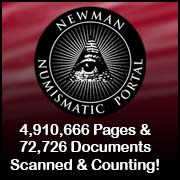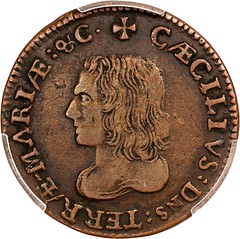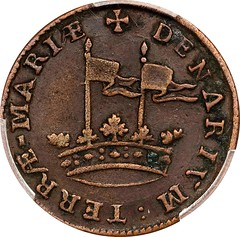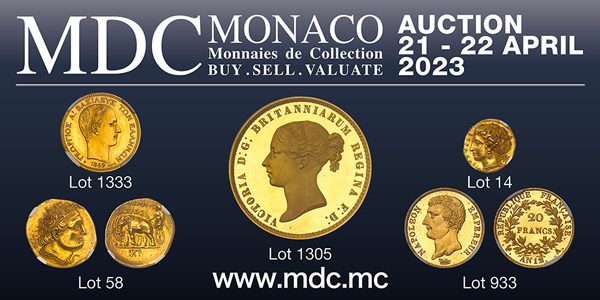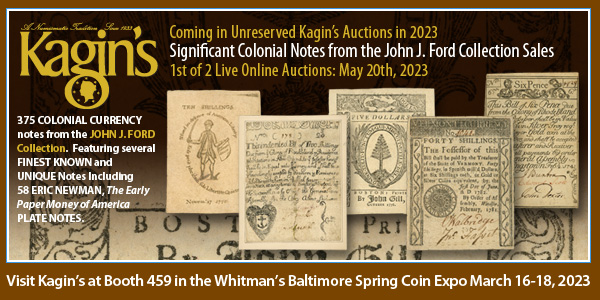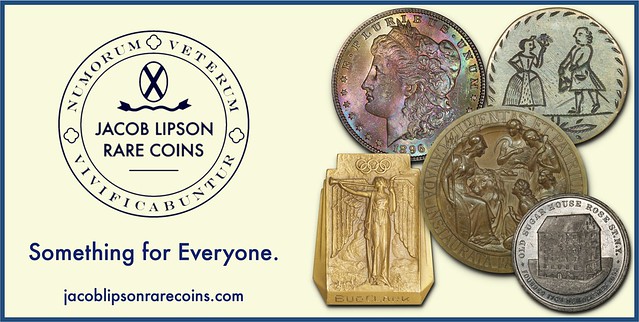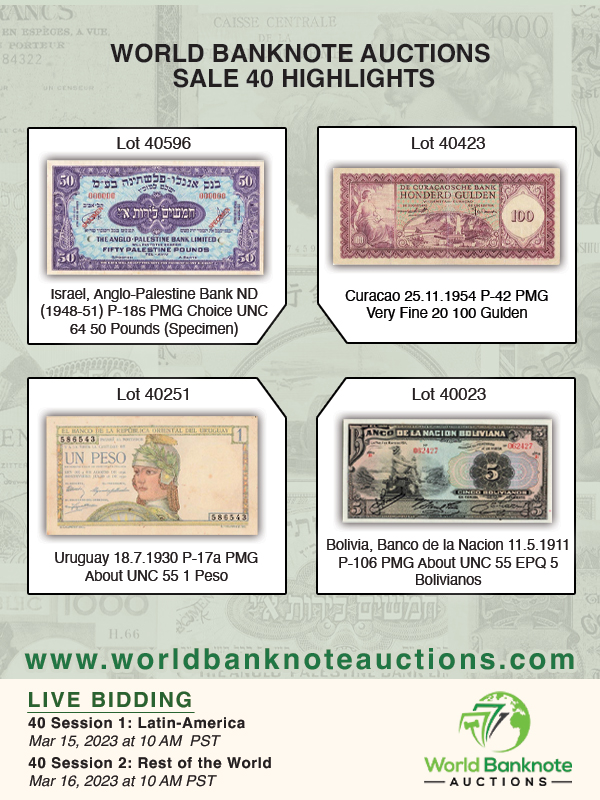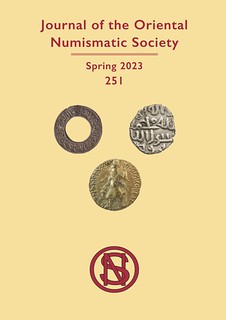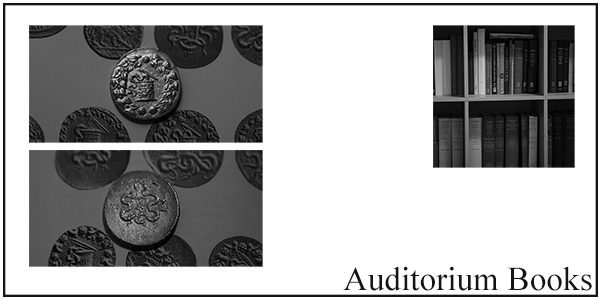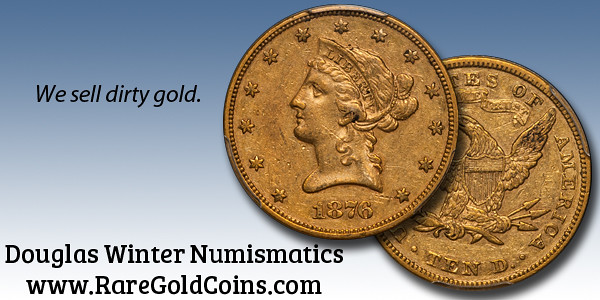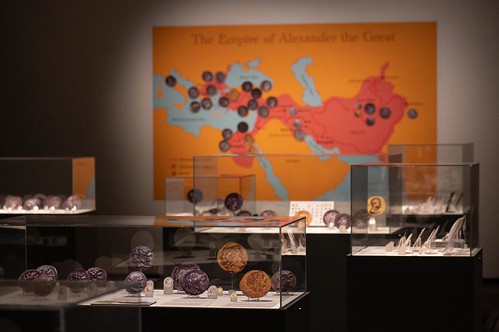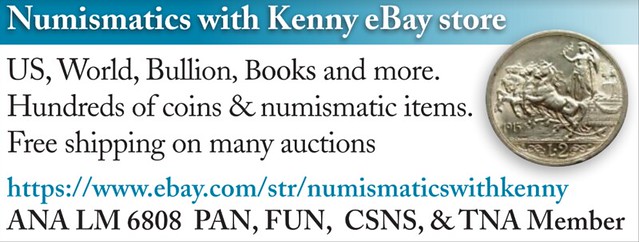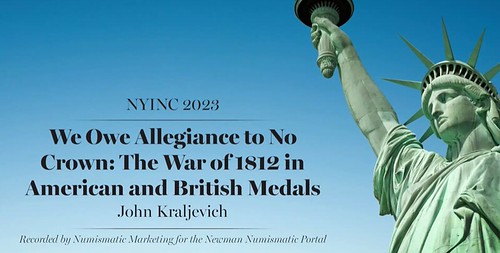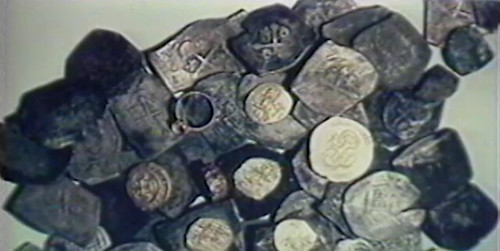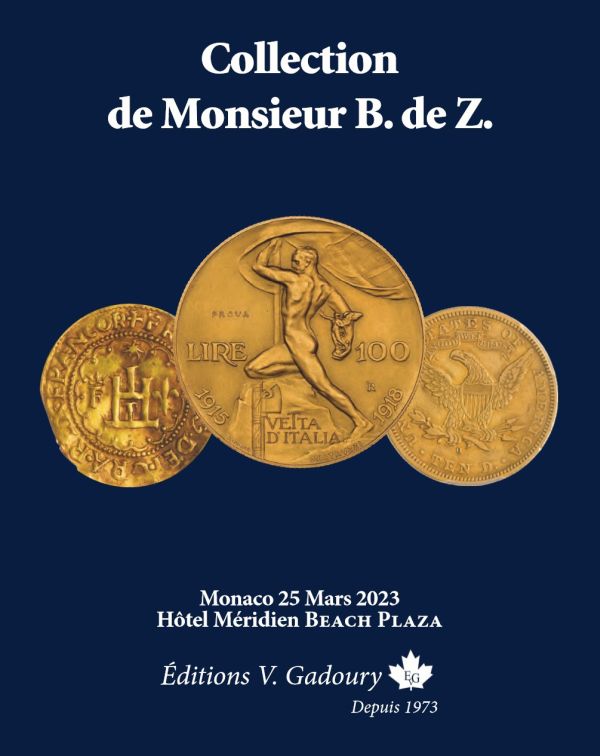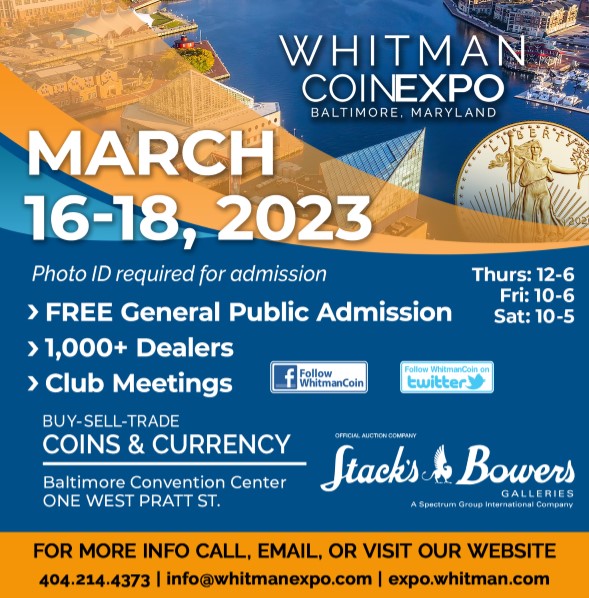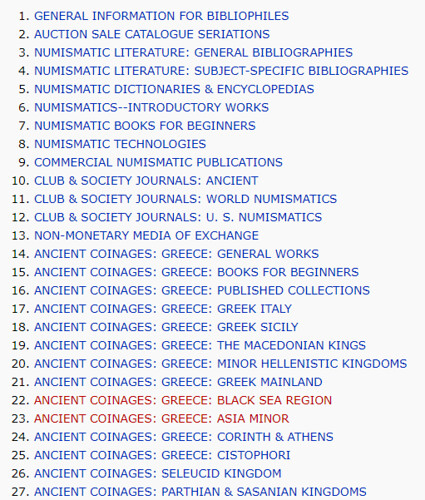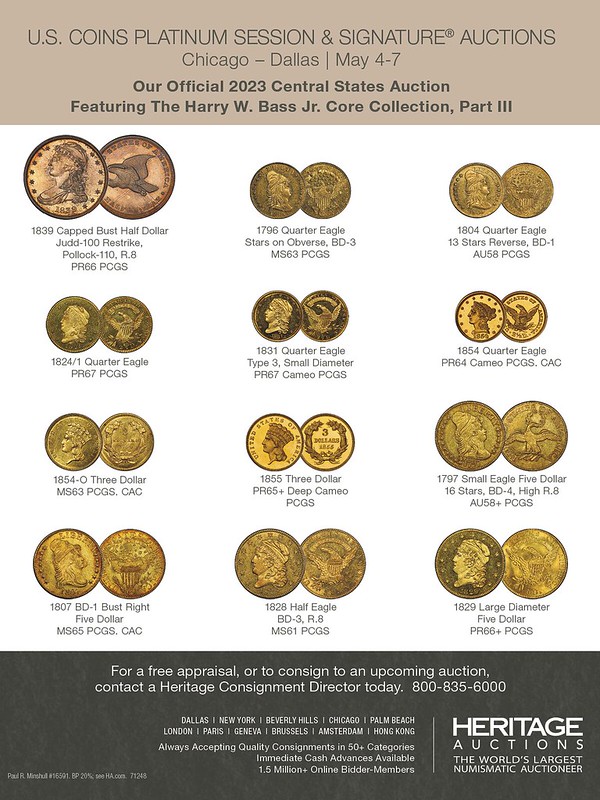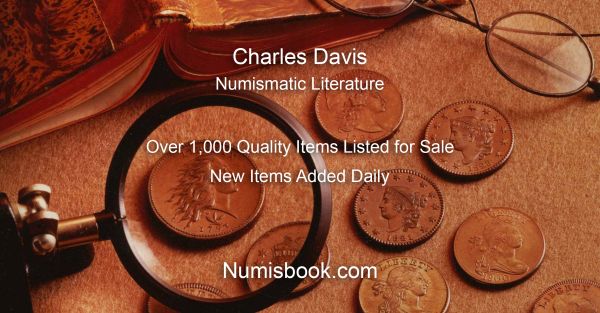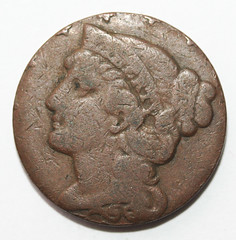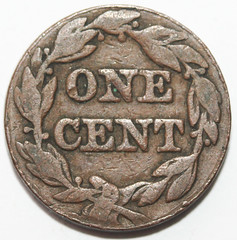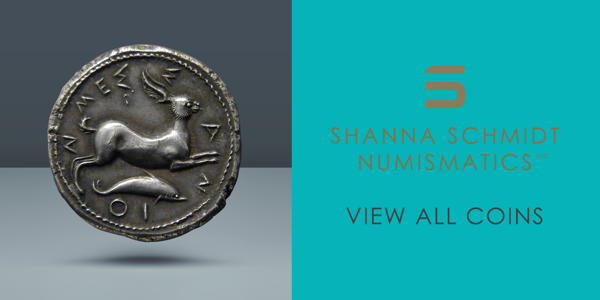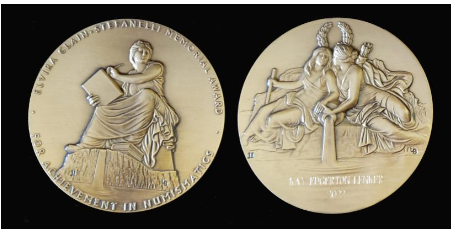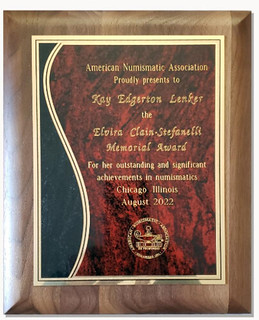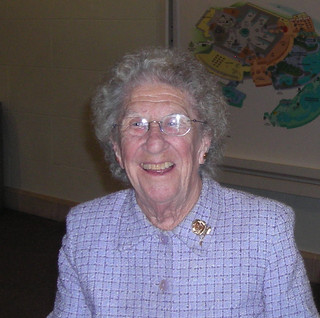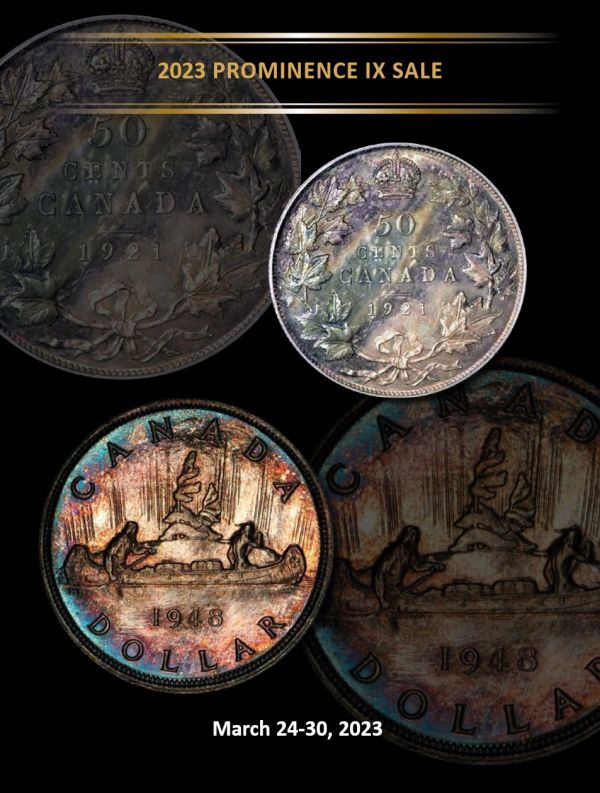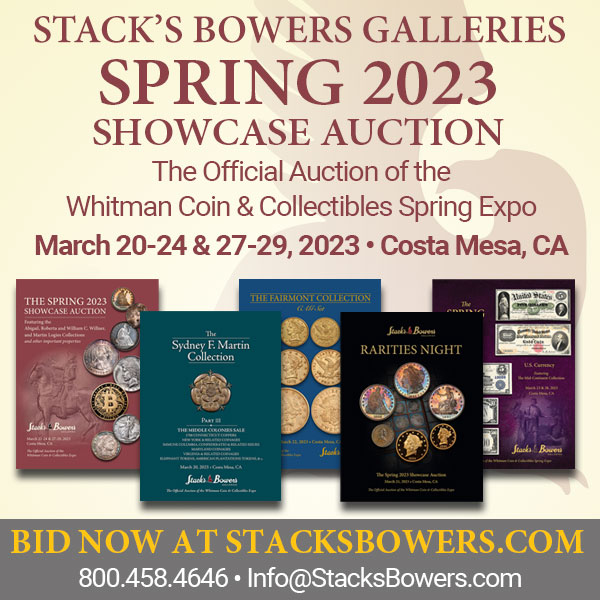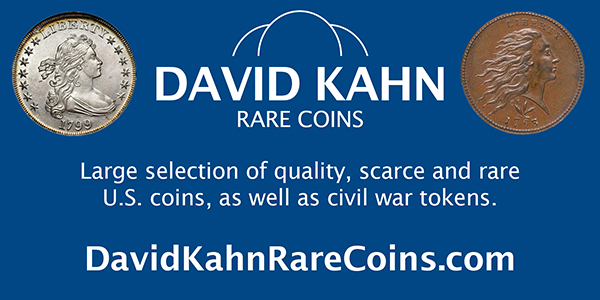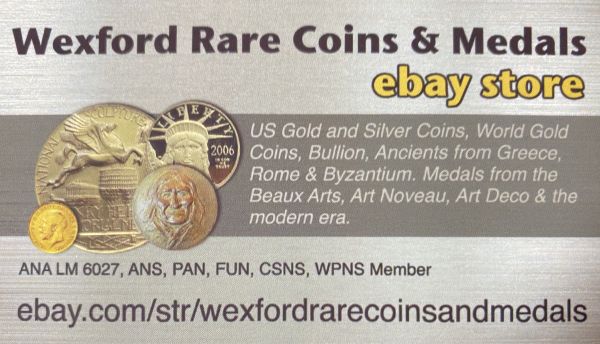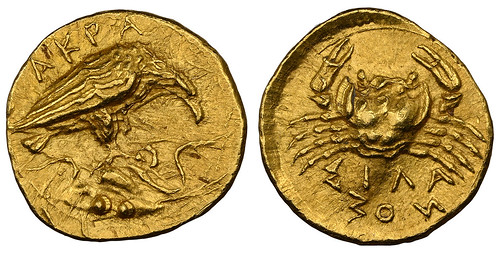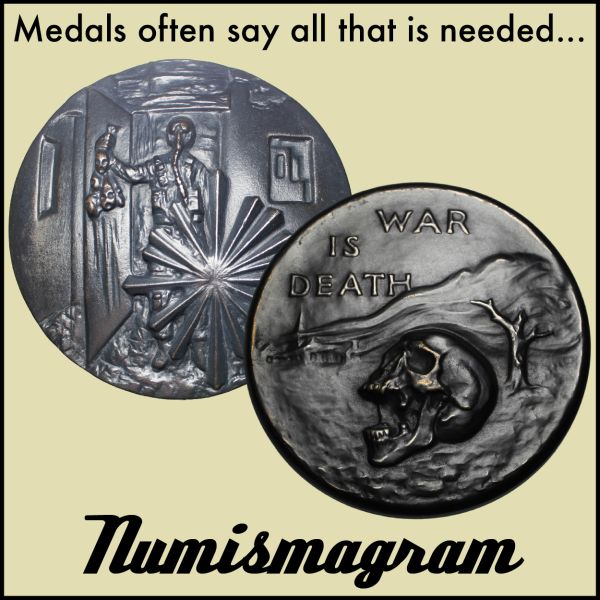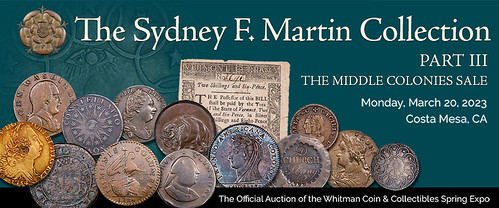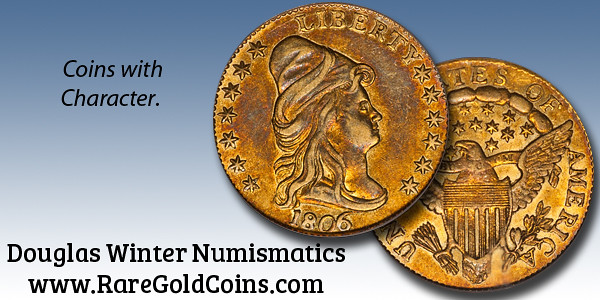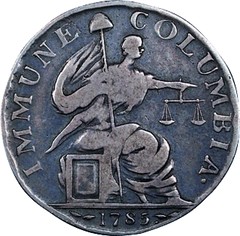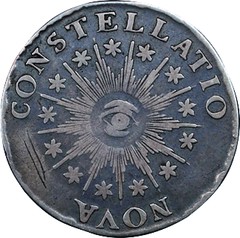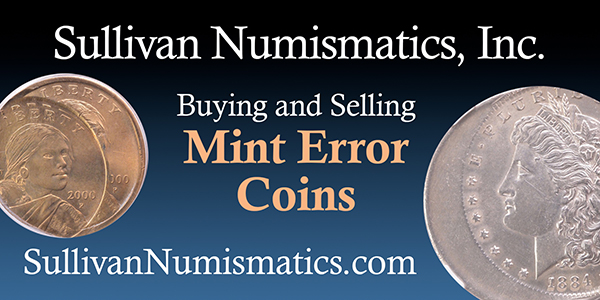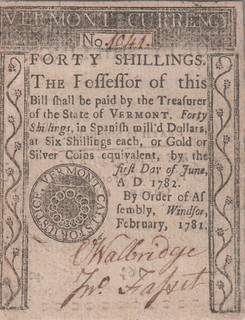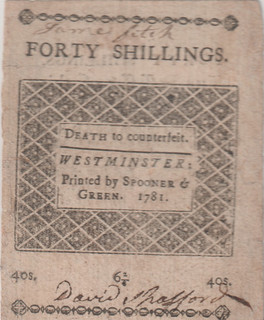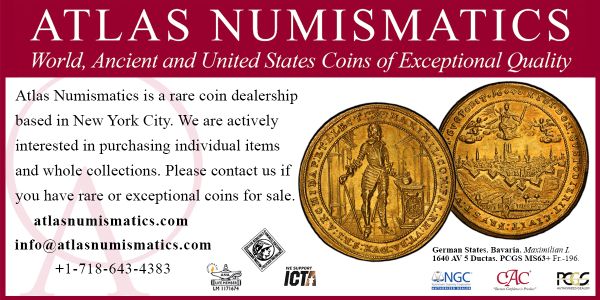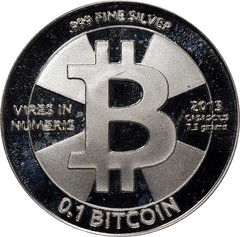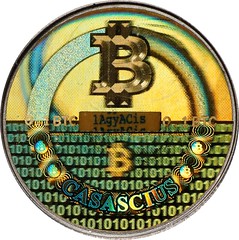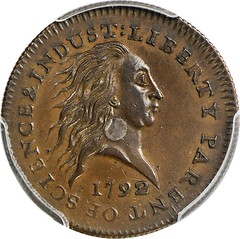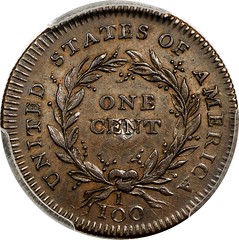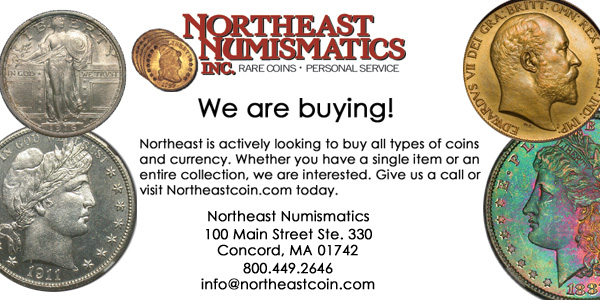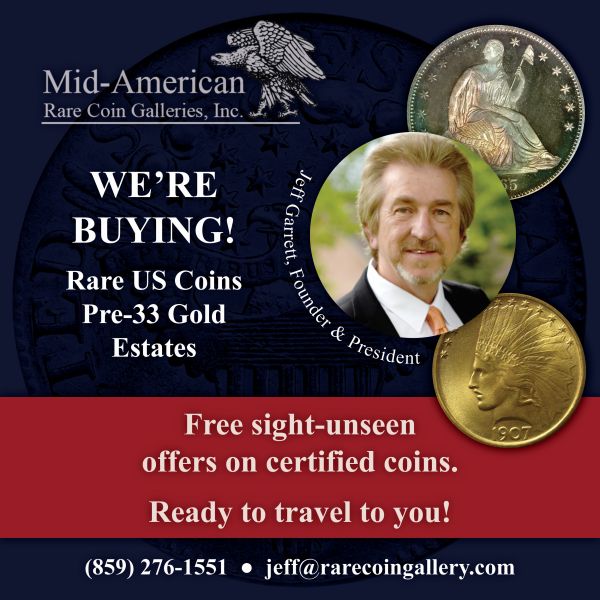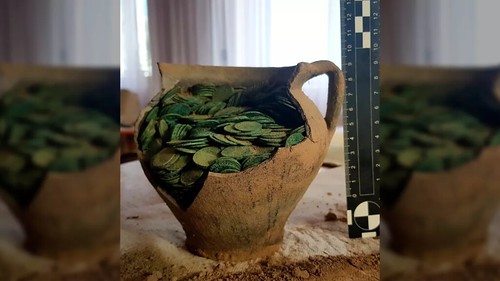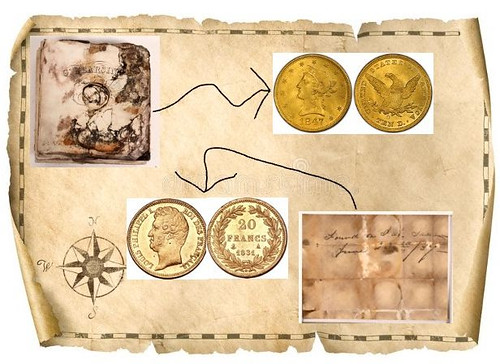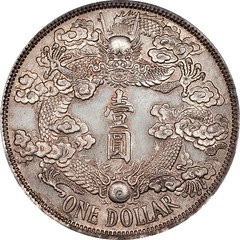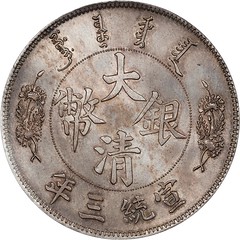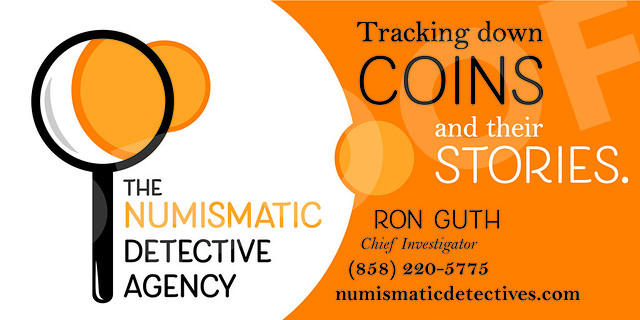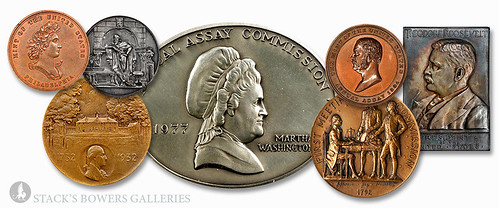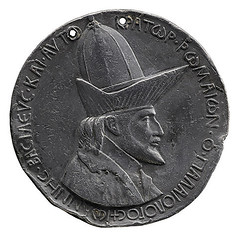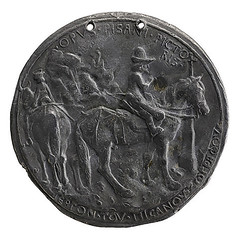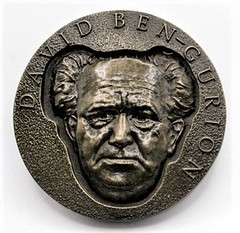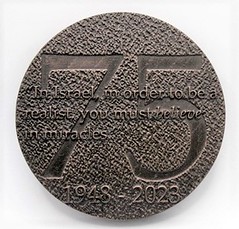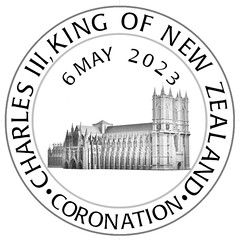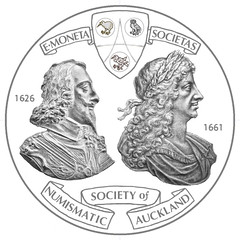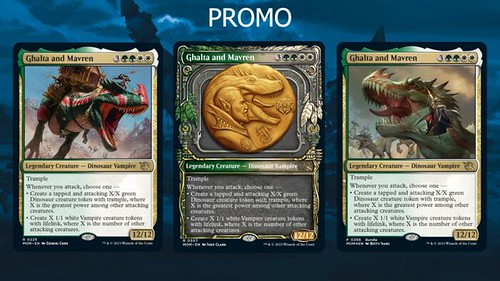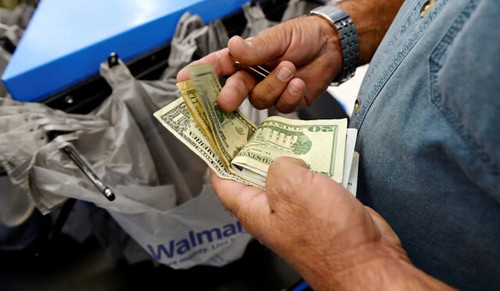
Visit our NBS Sponsors




About UsThe Numismatic Bibliomania Society is a non-profit association devoted to the study and enjoyment of numismatic literature. For more information please see our web site at coinbooks.org SubscriptionsThose wishing to become new E-Sylum subscribers (or wishing to Unsubscribe) can go to the following web page link MembershipThere is a membership application available on the web site Membership Application To join, print the application and return it with your check to the address printed on the application. Print/Digital membership is $40 to addresses in the U.S., and $60 elsewhere. A digital-only membership is available for $25. For those without web access, write to: Charles Heck, Treasurer AsylumFor Asylum mailing address changes and other membership questions, contact Chuck at this email address: treasurer@coinbooks.org SubmissionsTo submit items for publication in The E-Sylum, write to the Editor at this address: whomren@gmail.com BUY THE BOOK BEFORE THE COINSale CalendarWatch here for updates! |
- WAYNE'S WORDS: THE E-SYLUM MARCH 12, 2023
- NEW BOOK: ANCIENT GREEK AND ROMAN COINS, VOL II
- NEW BOOK: FIVE GUINEAS AND FIVE POUNDS
- NEW BOOK: 1923 WEISSENBURG INFLATION MONEY
- ORIENTAL NUMISMATIC SOCIETY SPRING 2023
- HIGGINS MUSEUM HIRES CUHAJ AS CURATOR
- POWER, IDENTITY AND ALEXANDER THE GREAT
- 2023 NYINC CONVENTION VIDEO ON NNP
- VIDEO: BUDDY EBSEN AND MORE
- PHOTOGRAPHING A COIN'S THIRD SIDE
- DON'T FORGET THE NBS WIKI!
- MORE ON CORNELIUS VERMEULE
- COPPERHEAD BADGES OF THE CIVIL WAR
- NOTES FROM E-SYLUM READERS: MARCH 12, 2023
- DAVID LANGE'S NUMISMATIC LEGACY
- RICHARD BEALE OF ROMA NUMISMATICS ARRESTED
- VOCABULARY TERMS: MISSING LETTERS AND MORE
- ARABELLA HUNTINGTON (1850-1924)
- ATLAS NUMISMATICS MARCH 2023 UPDATE
- SYDNEY F. MARTIN COLLECTION PART III
- SYD MARTIN COLLECTION PART III HIGHLIGHTS
- KAGIN'S TO OFFER NEWMAN PLATE NOTES
- STACK'S BOWERS PHYSICAL CRYPTOCURRENCY SALE
- NUMISMATIC NUGGETS: MARCH 12, 2023
- ROMAN COIN HOARD FOUND IN BERNESE ALPS
- WATCHET MUSEUM DISPLAYS ANGLO-SAXON COINS
- 17TH-CENTURY COIN HOARD FOUND IN POLAND
- REVIEWING THE MILLHOLLAND COLLECTION
- SS CENTRAL AMERICA TREASURE HUNT
- THE REVERSED DRAGON DOLLAR
- ORIGIN OF THE U.S. ASSAY COMMISSION MEDALS
- 2023 ANIMALS IN WAR AND PEACE MEDALS
- GREG LOUGANIS AUCTIONING OLYMPIC MEDALS
- THE 2022 MCA ANNUAL MEDAL
- JAHF ISSUES DAVID BEN-GURION MEDAL
- CHARLES III CORONATION COMMEMORATIVE MEDAL
- JODY CLARK'S MAGIC: THE GATHERING ARTWORK
- IN DEFENSE OF CASH
- LOOSE CHANGE: MARCH 12, 2023
Click here to read the thin version on the web
Click here to subscribe
Click here to access the complete archive
To comment or submit articles, reply to whomren@gmail.com
Content presented in The E-Sylum is not necessarily researched or independently fact-checked, and views expressed do not necessarily represent those of the Numismatic Bibliomania Society.
WAYNE'S WORDS: THE E-SYLUM MARCH 12, 2023
 New subscribers this week include:
Clifford Barber, courtesy Steve Hill;
John Dale Beety,
Cary Bown, and
Stephen Majerowicz.
Welcome aboard!
New subscribers this week include:
Clifford Barber, courtesy Steve Hill;
John Dale Beety,
Cary Bown, and
Stephen Majerowicz.
Welcome aboard!
Thank you for reading The E-Sylum. If you enjoy it, please send me the email addresses of friends you think may enjoy it as well and I'll send them a subscription. Contact me at whomren@gmail.com anytime regarding your subscription, or questions, comments or suggestions about our content.
This week we open with three new books, a periodical issue, museum announcements, updates from the Newman Numismatic Portal, and more.
Other topics this week include inflation money, the Higgins Museum, Buddy Ebsen, Cornelius Vermeule, David Lange, copperhead badges, fixed price offerings and auction previews, hoard finds, the reversed dragon dollar, the Millholland collection, Assay Commission medals, and new medal sales.
To learn more about the Oriental Numismatic Society, Alexander the Great, the coin's Third Side, the NBS Wiki, overdate mint bags, cord wood, the arrest of a coin dealer, the Capture of Bouchain medal, the Lord Baltimore Denarium, Poverty Hollow, Aethelred the Unready, and how we're transitioning into cyborgs, read on. Have a great week, everyone!
Wayne Homren
Editor, The E-Sylum
NEW BOOK: ANCIENT GREEK AND ROMAN COINS, VOL II
SPINK has published the second volume in David Sear's series on ancient Greek and Roman coins. -Editor
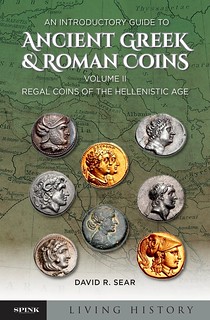 An Introductory Guide to Ancient Greek and Roman Coins Volume II: Regal Coins of the Hellenistic Age
An Introductory Guide to Ancient Greek and Roman Coins Volume II: Regal Coins of the Hellenistic Age
by David Sear
£50.00
This is the second volume (of three) of David Sear's new introductory guide to ancient coins, covering the coinages of the successor kingdoms to Alexander the Great's Vast conquests in the eastern Mediterranean region, the Middle East and beyond. It forms part of Spink's new Living History series.
Ancient coins have long fascinated generations of collectors by virtue of their beauty, the stories they tell, and for the unique insight they give into the history of the time in which they were made. They can be held, felt, and examined without the need for visiting a museum - they are, quite literally, living history.
NEW BOOK: FIVE GUINEAS AND FIVE POUNDS
Another book recently published by SPINK is Greg Holloway's work on the Great Britain Five Guineas and Five Pounds coin. I've always has a soft spot for complete books written about a single coin. -Editor
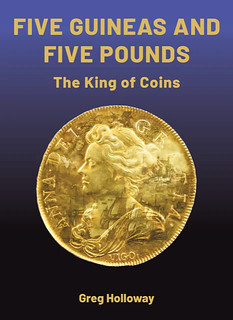 Five Guineas and Five Pounds: the King of Coins
Five Guineas and Five Pounds: the King of Coins
by Greg Holloway
£60.00
Numismatist Greg Holloway brings decades of passionate research to today's reader to learn about the greatest of European rarities, the Five Guineas and Pounds - or King of Coins.
Large grand gold coins of centuries gone by are the ultimate treasures - but the most important of all is the Great Britain Five Guineas and Five Pounds, the largest gold coin ever made for commerce for a significant period of time.
Hardback
273 x 210mm
612pp
NEW BOOK: 1923 WEISSENBURG INFLATION MONEY
Here's a Google-translated article from Geldscheine Online about a new (free!) book on the 1923 inflation money of Weissenburg, Germany. -Editor
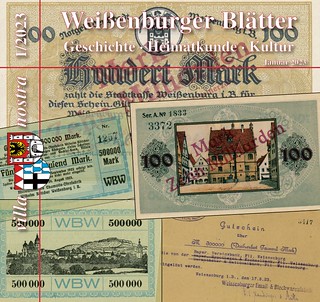 Crisis year and inflation 1923 in Weißenburg
Crisis year and inflation 1923 in Weißenburg
35 pages, illustrated in colour, format 200 x 210 mm, soft cover with staples;
Free delivery by the city administration: https://www.weissenburg.de/kontakt/
Free PDF download: https://www.weissenburg.de/villa-nostra/
100 years ago German inflation peaked. Since the beginning of the war in 1914, the value of the mark has steadily decreased and from August 1923 it was in free fall. The currency was not stabilized until November with the help of the Rentenmark.
ORIENTAL NUMISMATIC SOCIETY SPRING 2023
The latest issue of the Journal of the Oriental Numismatic Society will be available soon. Editor Paula Turner submitted the issue contents. Interesting topics. -Editor
A Yaudheya coin of the bull/elephant type with a new legend
Devendra Handa
A gold parcel hoard of Kanishka I from Skhakot, Malakand District near Peshawar, Pakistan
Gul Rahim Khan
A unique Fatimid damma from ‘al-Sind wa al-Hind'
Bilal Ahmed
A group of twelfth-century Indian gold coins from Balkh
John S. Deyell
Reading suggestions and revised attribution for some Malay tin coins recovered from the Batanghari and Musi rivers, Sumatra
Aditya Bayu Perdana
HIGGINS MUSEUM HIRES CUHAJ AS CURATOR
George Cuhaj has been hired as curator of the Higgins Museum of National Bank Notes. -Editor
Higgins Museum hires Cuhaj for 2023 Summer Season
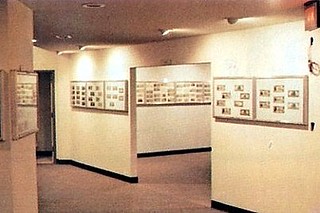 The Higgins Museum of National Bank Notes has hired George Cuhaj as curator for the
2023 summer season.
The Higgins Museum of National Bank Notes has hired George Cuhaj as curator for the
2023 summer season.
Located in Okoboji, Iowa since 1978, the museum has the largest collection of National
Bank Notes on permanent exhibition in the nation. The exhibition includes examples of
large and small size bank notes of all series and denominations with primary emphasis on
Iowa and surrounding states. Additional items include bank postcards, a bank teller's
cage, intaglio spider
press, a four note sheet signature imprint machine and cutter in
addition to an extensive research library with a banking emphasis.
POWER, IDENTITY AND ALEXANDER THE GREAT
Curator Marina Fischer passed along a great set of photos of the new exhibit The Birth of Portraiture: Alexander the Great and His Successors at the Nickle Galleries, University of Calgary. Here are a few selected photos - see the complete gallery online for a tour of the exhibit.
The University is also sponsoring a two-day numismatic symposium at the conclusion of the exhibit's run. -Editor
2023 NYINC CONVENTION VIDEO ON NNP
The latest addition to the Newman Numismatic Portal is video from the January 2023 NYINC. Project Coordinator Len Augsburger provided the following report. -Editor
New York International Numismatic Convention Video on Newman Portal
The New York Numismatic International Convention is a fixture on the annual coin calendar, featuring a robust array of auction sales, a vibrant bourse, and an engaging program of meetings and presentations. The American Numismatic Society annual Gala, held the same week, is the perfect go with
event and highlights academic and organizational advancements over the past year.
THE BOOK BAZARRE
Bowers Serieswas written by award-winning author Joshua McMorrow-Hernandez, who presents these silver coins to both collectors and investors. 384 pages. Order your copy online at Whitman.com , or call 1-800-546-2995.
VIDEO: BUDDY EBSEN AND MORE
The David Lisot Video Library on the Newman Numismatic Portal can be found at:
https://nnp.wustl.edu/library/multimediadetail/522852
We highlight one of his videos each week in The E-Sylum. Here's one from 1987 where David interviews actor Buddy Ebsen, dealer David Hall, and others. -Editor
PHOTOGRAPHING A COIN'S THIRD SIDE
Judy Blackman passed along this announcement of the first South Wellington Coin Society Literary Award. Thank you, and congratulations! -Editor
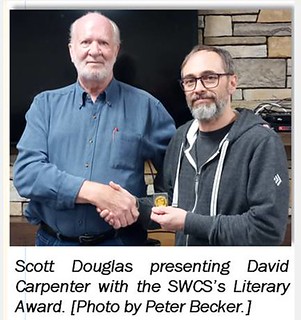 President Scott E. Douglas presented the first South Wellington Coin Society Literary Award to David Carpenter for his article titled "Scanning on the Edge: Photographing a Coin's Third Side" (go to this link to read the article starting on page 5,
https://nnp.wustl.edu/library/book/621680).
President Scott E. Douglas presented the first South Wellington Coin Society Literary Award to David Carpenter for his article titled "Scanning on the Edge: Photographing a Coin's Third Side" (go to this link to read the article starting on page 5,
https://nnp.wustl.edu/library/book/621680).
After this article was published, folks wanted to see David's invention, so he kindly demonstrated it before the SWCS members during the August 2022 membership meeting (see photos herein). David presented his ground breaking invention, which is one of the most useful ever encountered by numismatists. David created a lot of excitement in the hobby.
Congratulations David! The new South Wellington Coin Society Literary Award is designed to recognize authors of articles on significant numismatic subjects. David said, Thanks very much! It's really great to be recognized.
DON'T FORGET THE NBS WIKI!
David Fanning writes:
"I was talking with a friend who is undertaking a research project and trying to answer some questions he had, when I remembered the NBS Wiki and, in particular, its bibliography. This is a really useful resource and one that unfortunately is under-utilized. I tend to forget it's out there, and it obviously took a lot of work to put it together (I had nothing to do with it). If you could give it some exposure through The E-Sylum, that would be great."
Indeed. While overshadowed by the newer and much larger Newman Portal, the Numismatic Bibliomania Society's website Wiki section is a wealth of great information, well organized. Built with the help of NBS members and E-Sylum readers led mainly by Tom Wetter it's still available on the website and sees a decent amount of traffic from Internet searchers.
The bibliography has 105 sections including General Information, Ancient Coinages, Medieval, Modern, Paper Money and Grading. -Editor
MORE ON CORNELIUS VERMEULE
Patrick McMahon submitted these thoughts on Cornelius Vermeule. Thank you. -Editor
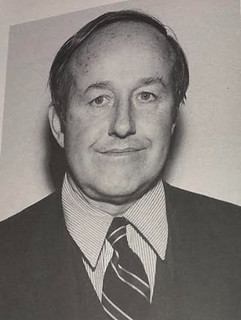 Last week, Pete Smith wrote that his article about Cornelius Vermeule was a
Last week, Pete Smith wrote that his article about Cornelius Vermeule was a frustrating article to research.
I can honestly say that that fact would have delighted Cornelius himself. And I have to say I still miss him terribly!
I didn't know Cornelius Vermeule until the last four or so years of his life. But during that time, he would call me at least three times a week. He was wheelchair-bound and had limited opportunities to visit the museum . But when the Classical department told me he was in the building I would come to see him. He was larger than life and this is mostly a reminiscence, but I do have one correction about the re-issue of Numismatic Art in America.
When we talked to each other, we mostly talked about numismatics, the Red Sox, or Boston College. He also liked to send requests or musings on postcards by regular mail. He would fill every inch of space on the card, vertically separating the text from the address with one of his address labels. He would always cross out Dr.
on the label and write Khedi
in its place. And he always signed off as Khedi. I have one message from him where he was criticizing the then new Presidential dollars (he did not like the size) and signed off as Khedi Rittenhouse. Khedi is Arabic or Turkish for Dog
and he loved dogs. He created a large collection of medals focusing on dogs and eventually gave it to Princeton University. He was a great character and storyteller and he liked nicknames and coded references—he always referred to the MFA as Mother Museum.
Harvey Stack knew him as Bucky.
I stuck with Cornelius.
COPPERHEAD BADGES OF THE CIVIL WAR
L. Michael Lawrence writes:
"As to the cut down large cents in the last couple of E-Sylum installments - If the two round pieces shown in the images were done contemporary to the times (circa 1860's and the Civil War) and are not more recent works, then they are examples of copperhead badges
which were carried in the North by confederate sympathizers who did not support the war and were used as identifiers with like minded people at the time. There is a fair amount of information available online by searching copperhead badges
or copperhead coins/tokens
. Genuine examples are collectible as early copper exonumia or civil war tokens, but later reproductions are out there and dedicated reproductions are also. They are another item of history pertaining to Civil War times."
NOTES FROM E-SYLUM READERS: MARCH 12, 2023
Kay Edgerton Lenker's Clain-Stefanelli Award
Ken Spindler passed along photos of Kay Lenker's Elvira Clain-Stefanelli medal and award plaque. Thank you. Well deserved. She will be missed. -Editor
To read the earlier E-Sylum article, see:
Remembering Kay Edgerton Lenker
(https://www.coinbooks.org/v26/esylum_v26n10a07.html)
Other topics this week include Overdated U.S. Mint Bags, Glenn Smedley, Robert Reford and Korean National Parks coins. -Editor
DAVID LANGE'S NUMISMATIC LEGACY
Jeff Burke submitted this article on the late Dave Lange. Thank you. -Editor
Remembering David W. Lange's Numismatic Legacy
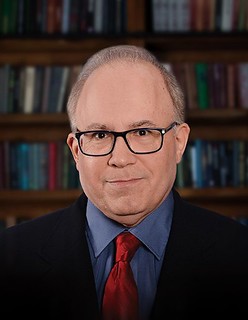 David Lange was a longtime ANA Summer Seminar instructor. I first met Lange at the 2011
Summer Seminar one day at breakfast, and enjoyed a number of conversations over meals with
him as the week progressed. I was intrigued to learn that he had worked as a design drafter for
Pacific Gas and Electric Company for fourteen years before being hired at NGC. I also liked
hearing about how much pleasure he took in assembling circulated coins from the Indian Head
cent, Lincoln cent, Buffalo nickel, Mercury dime, and Liberty Walking half dollar series to have
a coin collection like the one that he had in childhood.
David Lange was a longtime ANA Summer Seminar instructor. I first met Lange at the 2011
Summer Seminar one day at breakfast, and enjoyed a number of conversations over meals with
him as the week progressed. I was intrigued to learn that he had worked as a design drafter for
Pacific Gas and Electric Company for fourteen years before being hired at NGC. I also liked
hearing about how much pleasure he took in assembling circulated coins from the Indian Head
cent, Lincoln cent, Buffalo nickel, Mercury dime, and Liberty Walking half dollar series to have
a coin collection like the one that he had in childhood.
It was quite a thrill to talk with David about some of his books I had read, including his History of the United States Mint and Its Coinage, The Complete Guide to Lincoln Cents, The Complete Guide to Buffalo Nickels, and The Complete Guide to Mercury Dimes! Lange's books were of tremendous help to me in selecting key date coins to purchase in these series, and my copies of them are filled with underlined sections and notations.
RICHARD BEALE OF ROMA NUMISMATICS ARRESTED
The other shoe has dropped in the case of two rare ancient coins sold at auction in 2020. It has been reported that the owner of Roma Numismatics Limited, Richard Beale, was arrested in January over falsified records of ownership for the two coins. -Editor
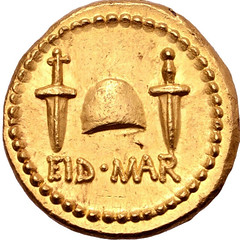 Richard Beale, the director of a London-based auction house, was arrested in New York City in January on charges relating to his sale of multi-million dollar ancient coins. His arrest has not been previously reported.
Richard Beale, the director of a London-based auction house, was arrested in New York City in January on charges relating to his sale of multi-million dollar ancient coins. His arrest has not been previously reported.
Beale is the owner and managing director of Roma Numismatics Limited, which claims to be one of the world's foremost auction houses for rare and collectible coins,
according to its website.
VOCABULARY TERMS: MISSING LETTERS AND MORE
Here's another collection of short entries from Dick Johnson's Encyclopedia of Coin and Medal Terminology. -Editor
Missing Letters. The obliteration of letters or other detail during a long press run. There are two causes: a filled die, or heavy die polishing. Loose particles, scrap debris or metal lodged in a die cavity precluding the letter or detail from being fully struck up; in time the letter or detail disappears completely once filled. Also, dies are polished to remove some imperfection, as clash marks, and detail is removed by die retooling. Thus letters, figures, mintmarks, monograms and small portions of the design have been known to disappear on struck pieces. See filled die.
ARABELLA HUNTINGTON (1850-1924)
Archer M. Huntington was a major benefactor of the American Numismatic Society in New York, and served as its President from 1905 to 1910. E-Sylum Feature Writer and American Numismatic Biographies author Pete Smith submitted this background article illustrating Huntington's family and wealth. Thanks. -Editor
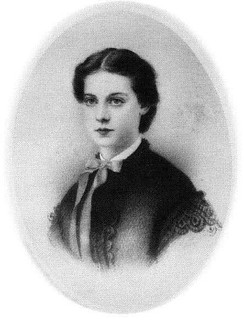 Something different this week. I am not going to write about the numismatic accomplishments of
Archer Milton Huntington. Rather I am going to write about his mother.
Something different this week. I am not going to write about the numismatic accomplishments of
Archer Milton Huntington. Rather I am going to write about his mother.
Let's start with the birth of Arabella Duval Yarrington. She gave her birthdate as June 1, 1850, but there is reason to doubt. The 1850 Census was recorded in Richmond, Virginia, in December of 1850. In that Census, Richard Milton Yarrington (1807-1859), a machinist, was married to Catherine James Sims Yarrington (1819-1888). Among their children was Catherine, age 5/12 years, born in Virginia, which would correspond with her birth in June of 1850. How Catherine became Arabella is one piece in the larger puzzle of her life.
Richard Yarrington died in 1859, leaving Catherine to raise five children as the Civil War was about to threaten Richmond. She opened a boarding house at Shockoe Bottom in the flood plain near the canal in Richmond. This was the entertainment district that included taverns, gambling parlors and brothels.
ATLAS NUMISMATICS MARCH 2023 UPDATE
Atlas Numismatics has updated their website with 460 new coins, medals, and tokens at fixed prices. Selections include the following items. Great coins and medals! -Editor
Atlas Numismatics Publishes their Newest Fixed-Price List
Pedigreed Dilitron (2 Litrai) of Acragas
1073129 | GREEK. SICILY. Acragas (Agrigentum/Akragas). Struck circa 410-406 BC. Silanos AV Dilitron. NGC Ch. MS (Choice Mint State) Strike 5/5 Surface 5/5. 1.34gm. AKRA. Eagle right perched on rocks, clutches a serpent / SI?A/ SOA (retrograde). Crab (Cancer). Rizzo Table. III, 8 (this coin); Westermark, Akragas 1015.4 (this coin).
Superb and exceptional.
Ex Pennisi di Floristella (noted on insert); Ex. Moretti Collexction; Ex- NAC 10, Zürich
1997, Lot 96. Rizzo (Monete Greche della Sicilia, Rome, 1946) plate coin.
$49,500
SYDNEY F. MARTIN COLLECTION PART III
In a Stack's Bowers blog article, John Kraljevich summarizes part III of the Syd Martin Collection, The Middle Colonies Sale.
-Editor
THE MIDDLE COLONIES SALE
1788 Connecticut Coppers • New York & Related Coinages • Immune Columbia, Confederatio & Related Issues
Maryland Coinages • Virginia & Related Coinages • Elephant Tokens, American Plantations Tokens, & c.
Welcome to the third chapter of our offering of the Syd Martin Collection. We've gathered together a seemingly disparate group of early American numismatic items and titled this The Middle Colonies Sale.
The offerings, historically and economically, may be more connected than they would seem at first blush.
SYD MARTIN COLLECTION PART III HIGHLIGHTS
Here are a number of highlights from the upcoming Stack's Bowers sale of the Syd Martin Collection, Part III. -Editor
1785 Immune Columbia / Nova Constellatio. W-1985, Breen-1120. Rarity-6+. Silver. Reeded Edge. 13 Stars. VF-20 (PCGS).
KAGIN'S TO OFFER NEWMAN PLATE NOTES
In May and September Kagin's Auctions will offer colonial notes plated in Eric Newman's classic work, The Early Paper Money of America. Here's the press release. -Editor
58 Newman Plate Notes Featured in Kagin's Auction of John J. Ford Colonial Currency Highlights
Kagin's Auctions will be offering 58 plate notes from the standard colonial currency reference, The Early Paper Money of America by Eric P. Newman. The first on-line only auction is scheduled for May 20, 2023, and the second September 23, 2023. Each auction will contain scores of Newman plate notes and rarities.
Reference works typically illustrate the Finest Known Specimens of each type or variety listed as their plate notes, and that certainly is the case with these John J. Ford Highlights notes.
It is quite rare these days to encounter an auction sale with even 5% of the coins or currency being finest known specimens. Even the top 18th century Registry Sets don't usually contain more than 10% of reference plate notes in their offering,
observed Donald H. Kagin, President of Kagin's Auctions. We are excited to offer a sale that includes over 15% plate notes out of the 375 notes in our upcoming two auctions of Highlights from the John J. Ford Colonial Currency Collection.
STACK'S BOWERS PHYSICAL CRYPTOCURRENCY SALE
Crypto winter or no, physical cryptocurrency continues to be of interest. In this press release, Stack's Bowers announces their upcoming physical cryptocurrency sale. I'd never seen most of these before. -Editor
Stack's Bowers Galleries is proud to announce the Physical Cryptocurrency Session of their Official Auction of the Whitman Coin & Collectibles Spring Expo. This is Stack's Bowers Galleries' first crypto offering since their historic Cryptocurrency Anniversary sale in November 2022, an event that pushed the firm's total prices realized in this category above $2 million. The Spring 2023 sale is currently available for viewing and pre-sale bidding at StacksBowers.com; live bidding for the Cryptocurrency session will begin on March 24 at 2PM PDT / 5PM EDT. Winning bidders may pay their invoices with Bitcoin via BitPay for a 1% fee after authorization by Stack's Bowers Galleries prior to the sale.
NUMISMATIC NUGGETS: MARCH 12, 2023
Here's a selection of interesting or unusual items I came across in the marketplace this week. Tell us what you think of some of these. -Editor
The Morris 1792 Silver Center Cent
1792 Cent. Silver Center. Judd-1, Pollock-1. Rarity-6+. Copper with Silver Plug. Reeded Edge. MS-61 BN (PCGS). CAC.
Since our last offering of this coin (November 2017 Baltimore Auction, lot 10003), its status as a genuine Judd-1 Silver Center cent has been called into question through research conducted by Robert Rodriguez, Tony Lopez, Stuart Levine and Maureen Levine. This team of researchers conclude that the Morris specimen of Judd-1 offered here is a genuine Judd-2 cent with the silver plug added at a later time to simulate a Judd-1 example. Their findings are summarized in a video hosted by Robert Rodriguez for the 2020 Newman Numismatic Portal Symposium, which is available at the following link: https://nnp.wustl.edu/library/book/588141. Prospective bidders on this lot are encouraged to familiarize themselves with the research done and conclusions put forth by Mr. Rodriguez and his colleagues. However, Stack's Bowers Galleries is offering this coin as certified by PCGS and verified by CAC - in other words, as a genuine Judd-1 Silver Center cent certified as PCGS/CAC MS-61 BN.
We continue with our description of this coin as presented in our November 2017 Baltimore Auction offering, with minor updates.
This controversial piece is returning to market, and to its credit Stack's Bowers Galleries acknowledges the controversy right up front in its auction listing. See the complete lot description for more background on the Silver Center cents and the provenance of this specimen which once belonged to my fellow Pittsburgh-area club member, Dr. James O. Sloss of Beaver, PA. -Editor
To read the complete lot description, see:
1792 Cent. Silver Center. Judd-1, Pollock-1. Rarity-6+. Copper with Silver Plug. Reeded Edge. MS-61 BN (PCGS). CAC.
(https://auctions.stacksbowers.com/lots/view/3-118MRF/1792-cent-silver-center-judd-1-pollock-1-rarity-6-copper-with-silver-plug-reeded-edge-ms-61-bn-pcgs-cac)
Other topics this week include Alaska Trade Tokens, the 1940 Sarawak One Dollar note, and The Medallic History of England. -Editor
ROMAN COIN HOARD FOUND IN BERNESE ALPS
Arthur Shippee passed along this story about a Roman coin hoard found in the Bernese Alps back in 2020. Thanks. Here's a Google translation. -Editor
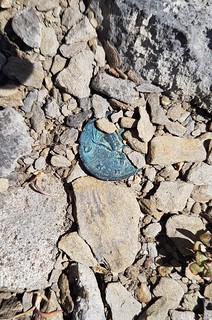 Coins and Roman rock crystals have been discovered in the high Bernese Alps,
Coins and Roman rock crystals have been discovered in the high Bernese Alps, near the Ammertenhorn, at 2600 meters above sea level
, announced the Archaeological Service of the canton of Bern on Monday.
The Ammertenhorn site in the municipality of Lenk in the Bernese Oberland was revealed in the summer of 2020 by a runner in the field
, explains the Archaeological Service in a press release. Research has then been carried out on this isolated high plateau
over the past two years in order to secure further discoveries. Since then, about a hundred Roman coins, the fragment of a bronze votive plaque – it is a leaf-shaped consecration offering – 27 rock crystals and other objects have been unearthed. day,
the press release lists.
Comparable sets of finds are often interpreted as offerings of consecration. The high plateau between the Ammertenhorn and the sublime Wildstrubel massif, visible from afar, could also have been a sacred place,
explains Adriano Boschetti, Bernese cantonal archaeologist.
WATCHET MUSEUM DISPLAYS ANGLO-SAXON COINS
A museum in Watchet, Somerset, England is displaying Anglo-Saxon coins related to the coastal town's history. -Editor
Two rare Saxon coins minted in Watchet will go on display at the Watchet Market House Museum from March. They are being loaned to the museum by Carhampton resident Cliff Barber.
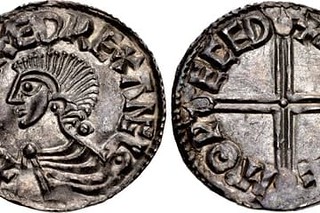 The oldest of the two coins was minted in Watchet under the reign of King Aethelred II, who ruled with a short interruption from the year 978 to 1016. Also known by the epithet Aethelred the Unready, his reign was the longest of any English king until Henry III broke his record in the 13th century. Aethelred earned infamy for his ordering of the St Brice's Day Massacre in which Danish settlers were 'exterminated' in Oxford.
The oldest of the two coins was minted in Watchet under the reign of King Aethelred II, who ruled with a short interruption from the year 978 to 1016. Also known by the epithet Aethelred the Unready, his reign was the longest of any English king until Henry III broke his record in the 13th century. Aethelred earned infamy for his ordering of the St Brice's Day Massacre in which Danish settlers were 'exterminated' in Oxford.
17TH-CENTURY COIN HOARD FOUND IN POLAND
Arthur Shippee also passed along this story of the discovery of a hoard of 17th-century Polish and Lithuanian copper coins. Thanks. -Editor
A metal detectorist searching for discarded tractor parts on a Polish farm discovered a completely different type of valuable metal: A spectacular hoard of 17th-century coins buried beneath the soil.
The hoard — a vast stash of about 1,000 copper coins — was found in late February near the small village of Zaniówka in eastern Poland, near the borders with Belarus and Ukraine, by a local man, Michal Lotys.
THE BOOK BAZARRE
REVIEWING THE MILLHOLLAND COLLECTION
Greg Reynolds has published Part 1 of a Greysheet series on the Millholland Collection to be auctioned by Stack's Bowers. Here's an excerpt - see the complete article online for more. -Editor
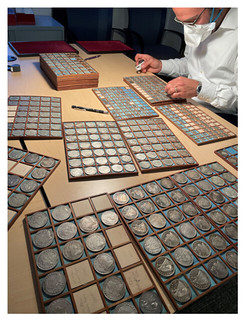 James A. Millholland stopped collecting coins circa 1894 and his collection of more than five hundred coins features many gems with very appealing natural toning, as well as a large number of circulated coins.
James A. Millholland stopped collecting coins circa 1894 and his collection of more than five hundred coins features many gems with very appealing natural toning, as well as a large number of circulated coins.
Millholland was born in 1842. He probably began collecting coins before he was twenty years old.
It is likely that Millholland purchased Proof sets directly from the U.S. Mint during his lifetime or obtained sets from someone who did. While his collection features many Proof copper, nickel and silver coins dating from 1859 to 1894, a majority of the coins in the Millholland Collection are business strikes.
SS CENTRAL AMERICA TREASURE HUNT
The sales are history now, but this week Holabird Western Americana called for a fun "Treasure Hunt" to reunite coins sold earlier with the artifacts they were found in. -Editor
We hid a treasure hunt within this SS Central America auction, and we're now ready to fill you in on the details!
Two clues...
THE REVERSED DRAGON DOLLAR
A Stack's Bowers blog article by Jeremy Bostwick highlights a high-grade example of the 1911 Reversed Dragon Dollar. -Editor
Our biannual Hong Kong auction is always a highly-anticipated trend-setter and market-maker, featuring countless rarities from the Pacific theater. Leading the pack in our April 2023 Hong Kong Rarities Night auction is lot 40162, an important rarity from the final year in the brief reign of Hsuan-t'ung, more commonly known as the boy-emperor Puyi. With a high-end estimate reaching seven figures, this silver Dollar pattern only comes to market rather infrequently; the last time was in our May 2020 Hong Kong auction. This despite the vast numbers of Chinese rarities offered in the time span since that appearance.
ORIGIN OF THE U.S. ASSAY COMMISSION MEDALS
A Stack's Bowers blog article by Chris Bulfinch examines the origin of the U.S. Assay Commission medals -Editor
In 1860, members of the U.S. Assay Commission were presented with medals for the first time. Bearing designs by James Longacre, one of which appears on an 1859 pattern half dollar, the 1860 Assay Commission medal inaugurated a century-long series sought after by U.S. exonumia specialists and others interested in medals produced by the U.S. Mint. Stack's Bowers Galleries is offering many Assay Commission Medals in our Spring 2023 Auction, including an example of the first issue.
2023 ANIMALS IN WAR AND PEACE MEDALS
Six more U.S. animal heroes will be honored in the 2023 Animals in War & Peace Medal Ceremony at the U.S. Capitol. Here's the press release. -Editor
 The Third Annual Animals in War & Peace Medal Ceremony will
recognize and honor six unsung U.S. animal heroes for their accomplishments in both war and peace in
Washington, DC on March 8, 2023.
The Third Annual Animals in War & Peace Medal Ceremony will
recognize and honor six unsung U.S. animal heroes for their accomplishments in both war and peace in
Washington, DC on March 8, 2023.
Since 1943, the United Kingdom has been the only country in the world to honor animals with its
international PDSA Dickin Medal, also known as the Victoria Cross for Animals.
U.S. Members of Congress will present medals to America's animal heroes at the March 8th ceremony for either the Medal of Bravery or Distinguished Service Medal which is commensurate with the British PDSA Dickin Medal.
GREG LOUGANIS AUCTIONING OLYMPIC MEDALS
Olympic medalist Greg Louganis is auctioning three of his medal to raise funds for charity. -Editor
Greg Louganis is auctioning three of his five Olympic medals in an effort to fund the Damien Center, Indiana's oldest and largest AIDS services center.
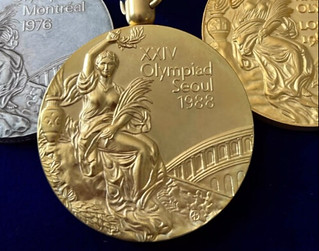 The three medals up for auction are:
The three medals up for auction are:
- 1976 silver medal for 10-meter platform
- 1984 gold medal for 3-meter springboard
- 1988 gold medal for 10-meter platform
The medals, they're in the history books,
Louganis said. Instead of holding on to them, I'm aiming to share my piece of Olympic history with collectors; together, we can help the Damien Center and its community to grow and thrive.
THE 2022 MCA ANNUAL MEDAL
The Medal Collectors of America produce a great series of annual medals. Some examples of the 2022 issue are still available - here's a description from the Fall 2022 MCA Advisory, excerpted from an article by Stephen Scher. -Editor
Antonio di Puccio Pisano (called Pisanello). JOHN VIII PALEOLOGUS, Emperor of Byzantium (b. 1392; r. 1425-1448). ca. 1438. Lead, cast, 104.1 mm. obverse.
It is generally acknowledged that the modern medal was invented around 1438 by Antonio di Pucci Pisano, called Pisanello (ca. 1395-1455) with his medal of the Byzantine emperor, John VIII Paleologus. This sculptural innovation was one manifestation in Italy of a new attitude towards the history, art, philosophy, and cultures of ancient Greece and Rome. One important result was a new understanding of the place of man in the universe, celebrating his or her distinct individuality, character, appearance, social position, beliefs, and accomplishments, or by commemorating significant historic events in a durable, reproducible, widely distributable medium. Yet Pisanello's medals and those that followed by other artists did not, at first, physically follow the format from which they were derived: ancient coinage.
JAHF ISSUES DAVID BEN-GURION MEDAL
Here is the press release for the latest medal issued by the Jewish-American Hall of Fame. Great portrait. -Editor
The Jewish-American Hall of Fame has commissioned former engraver of the U.S. Mint Jim
Licaretz to create an impressive 3 1/2 inch medal to commemorate the 75th Anniversary of Israel's
Independence on May 14th. The medal features an extremely high relief portrait of David Ben-
Gurion that lies entirely below the medal's upper surface. The reverse contains Ben-Gurion's
quote: In Israel, in order to be a realist, you must believe in miracles.
Money raised through the
sale of these medals will go to the non-profit Jewish-American Hall of Fame and the Jewish
National Fund - for the planting of a tree in Israel.
CHARLES III CORONATION COMMEMORATIVE MEDAL
Jim Duncan passed along information about a commemorative medal being struck by the Numismatic Society of Auckland to commemorate the Charles III Coronation event from a New Zealand perspective. For an order form, contact the N.S.A. Secretary at joshuazlee@hotmail.com . Prices are NZ dollars. -Editor
JODY CLARK'S MAGIC: THE GATHERING ARTWORK
An article by John Dale Beety examines the fantasy world art of Royal Mint coin designer Jody Clark. Very cool. Here's an excerpt - see the complete article online. -Editor
After more than two decades of playing Magic: The Gathering, it's hard for the game to shock me. Multiversal apocalypse? I've been through my share. Beloved characters die? I'd seen Bambi and read Where the Red Fern Grows by age ten. Even so, the March of the Machine previews debuted at MagicCon Philadelphia left me with my mouth open. Well, one preview in particular.
IN DEFENSE OF CASH
Last week we discussed the disappearance of automated teller machines as cash usage declines. This piece from National Review examines what we all lose when cash goes away. -Editor
There are dozens of touches that make the bar a time capsule from the 1960s. (It opened in 1968.) The jukebox plays real records, none of which are more current than 1975. The place isn't littered with TVs, so people actually speak to each other.
The U.S. Dollar's Global Reserve Status: No Sign of Slipping Sri Lanka Collapses under the Weight of Modern Monetary Theory The IMF and Sri Lanka Are Partners in Delusion But most importantly, you have to use cash. No credit, no debit, no checks, no tapping your phone on a screen.
LOOSE CHANGE: MARCH 12, 2023
Here are some additional items in the media this week that may be of interest. -Editor
This article from The Economist explores the connection between ancient coinage and democracy. Found via The Explorator newsletter. To subscribe to Explorator, send a blank email message to: explorator+subscribe@groups.io. -Editor
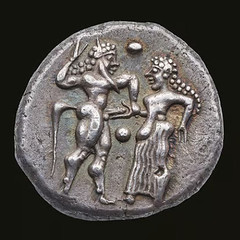 In the view of many, money corrupts democracy. In the view of Francis Albarède, however, it was money, in the form of coined silver, which created democracy in the first place.
In the view of many, money corrupts democracy. In the view of Francis Albarède, however, it was money, in the form of coined silver, which created democracy in the first place.
Dr Albarède is a geochemist at the École Normale Supérieure in Lyon, France. His definition of geochemistry
stretches, however, well beyond many people's, into political and economic history. In particular, he has just finished running the European Research Council's silver (Silver Isotopes and the Rise of Money) project. This, by studying the isotopic composition of ancient silver coins, has tried to draw conclusions about where the metal in a coin was mined, and thus about patterns of trade.
To read the complete article (subscription required), see:
Newfangled coins and mercenaries may have brought about democracy
(https://www.economist.com/science-and-technology/2023/03/08/newfangled-coins-and-mercenaries-may-have-brought-about-democracy)
Other topics this week include Jenny Lind and the Bureau of Engraving and Printing. -Editor

